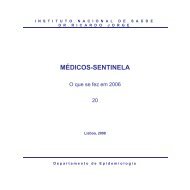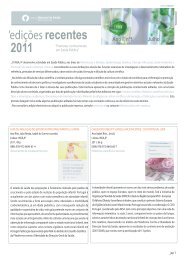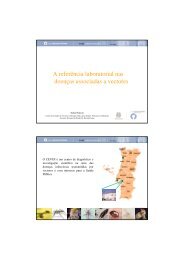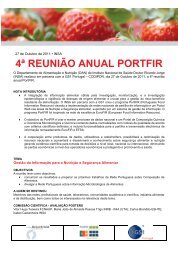European Society of Mycobacteriology - Instituto Nacional de Saúde ...
European Society of Mycobacteriology - Instituto Nacional de Saúde ...
European Society of Mycobacteriology - Instituto Nacional de Saúde ...
You also want an ePaper? Increase the reach of your titles
YUMPU automatically turns print PDFs into web optimized ePapers that Google loves.
PP-8<br />
Mycobacterium tuberculosis BEIJING GENOTYPE<br />
AND ORIGINS OF THE BULGARIANS<br />
Panaiotov, Stefan; Bachiyska, Elizabeta; Brankova, Nadia; Levterova, Victoria<br />
National Center <strong>of</strong> Infectious and Parasitic Diseases, S<strong>of</strong>ia 1504, Bulgaria<br />
Recent studies <strong>de</strong>monstrated that exist genotypes <strong>of</strong> M. tuberculosis locally distributed to specific geographic region.<br />
Other genotypes are distributed globally or on vast geographic areas. These facts led to other recent fundamental studies<br />
and conclusions that exists certain genetic predisposition <strong>of</strong> the ethnic groups to specific M. tuberculosis genotypes,<br />
hence genetic predisposition to tuberculosis specific genotypes is suspected. In the past and nowadays the waves <strong>of</strong> human<br />
migration coinci<strong>de</strong> with expansion <strong>of</strong> tuberculosis genotypes. In our study we associated the global distribution <strong>of</strong><br />
MTB Beijing genotype, its’ distribution in Bulgaria, the geographic regions <strong>of</strong> historical origin <strong>of</strong> the Bulgarian tribes, and<br />
the ethnic affiliation <strong>of</strong> the Bulgarians.<br />
For our analysis we used data published in the fourth international spoligotyping database (SpolDB4), publications, personal<br />
communications and <strong>of</strong>ficial historical theories regarding origins <strong>of</strong> the Bulgarians.<br />
From the literature and in SpolDB4 exists about 330 spoligotypes <strong>of</strong> Bulgarian M. tuberculosis clinical strains collected<br />
from all over the country. Beijing spoligotype was not i<strong>de</strong>ntified among them. We conclu<strong>de</strong>d that this MTB genotype is<br />
not (or very rare) distributed in Bulgaria. In Romania Beijing genotype was not i<strong>de</strong>ntified too (personal communication).<br />
Other countries associated with the origins and migration <strong>of</strong> the Bulgarians where Beijing genotype is not i<strong>de</strong>ntified is<br />
Iran. Significant part <strong>of</strong> the Bulgarian spoligotypes are phylogenetically related to MANU family, wi<strong>de</strong>ly distributed in India.<br />
These facts correlate with the wi<strong>de</strong>ly accepted theory that the origins <strong>of</strong> the Bulgarian tribes are <strong>of</strong> Indo-Iranian lineage.<br />
In contrary, this fact does not support the theory for the Turkik lineage or more precisely the Turano-Hunnic origins <strong>of</strong><br />
the Bulgarian ethnos.<br />
Beiging genotype is wi<strong>de</strong>ly distributed in Central Asian countries, Kazahstan, Turkmenistan, Russia, Turkey, China etc.<br />
Bulgaria has very active tourist, cultural, political, tra<strong>de</strong> and immigration links with all these countries. Based on these<br />
empiric facts we indirectly conclu<strong>de</strong> that there is genetic predisposed resistance <strong>of</strong> the Bulgarian and Iranian ethnos to<br />
MTB Beijing genotype.<br />
<strong>European</strong> <strong>Society</strong> <strong>of</strong> <strong>Mycobacteriology</strong> | 30 th Annual Congress | July 2009 | Porto - Portugal<br />
81

















